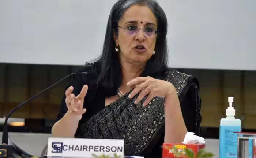The opposition Congress launched fresh tirade against Sebi Chairperson Madhabi Puri Buch over receiving regular income from private lender ICICI Bank and arm ICICI Prudential, while being the whole-time member and later Chairperson of the capital markets regulatory body.
Pawan Khera, Chairman, Media and Publicity Department, Congress, in a press conference said, “We asked three questions yesterday (which was directed towards ICICI bank, PN and Buch. Of the three, ICICI bank responded to our allegations, which has infact helped us in un-layering this expose further.
Khera further claimed that ICICI bank paid pensions to Buch which varied in various years and was not steady. He added that Buch availed ESOPs from ICICI even after superannuation from the Group. He questioned as to how retirement benefits or pensions be more than the annual average salary that Buch drew from ICICI.
Khera also raised questions on the TDS being paid by ICICI Bank on ESOPs to Buch.
“Why did ICICI pay the TDS on ESOPs on behalf of Buch? Does the bank follow the same protocol for all its past and present employees? Why didi ICICI not offer this TDS amount as taxable income of Buch? Is this not a clear non-compliance of the Income Tax Act?,” questioned Khera.
Response Of ICICI Bank On Congress’ Allegations
ICICI Bank in a stock exchanges in a filing, hours after the Congress party labeled office-for-profit charge against Buch yesterday said that the bank or its group of companies have not paid any salary or granted any employee stock ownership plan (ESOPs) to SEBI Chairperson Madhabi Puri Buch after her retirement, other than her retiral benefits.
“During her employment with the ICICI Group, she received compensation in the form of salary, retiral benefits, bonus and ESOPs, in line with applicable policies,” the ICICI Bank exchange filing read.
Buch had opted for superannuation from the Group with effect from October 31, 2013. Under the bank’s ESOP rules, the ESOPs vest over the next few years from the date of allotment, the lender asserted in the filing. “As per rules existing at the time of her ESOP grant, employees including retired employees had the choice to exercise their ESOPs anytime up to a period of 10 years from the date of vesting.”
“As per Income Tax rules, the difference between the price of the stock on the day of exercise and the allotment price is treated as perquisite income and is reflected in Part B of the Form16 of employees, including retired employees. The Bank is required to deduct the perquisite tax on this income. In addition, Form -16 covers the payment made towards the retiral benefits of former employees,” the exchange filing added.
All the payments made to Buch post her retirement had accrued to her during her employment phase with the ICICI Group.
Those payments comprised ESOPs and retiral benefits, the lender’s exchange filing concludes.



